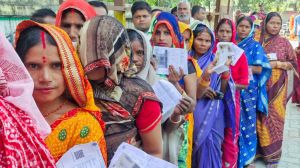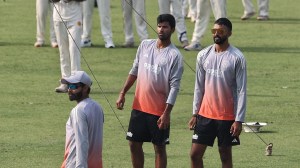"We owe an apology to the nation for Operation Bluestar"
Former finance minister Manmohan Singh's name has been doing the rounds as the Congress' prime minister-in-waiting. Neerja Chowdhury spoke t...

Former finance minister Manmohan Singh’s name has been doing the rounds as the Congress’ prime minister-in-waiting. Neerja Chowdhury spoke to the man who conceived and implemented India’s economic reforms. Excerpts:
I’m not aware of it. There are several leaders in the party. I am a newcomer to politics.
The Congress has taken a decision that the Congress Parliamentary Party will elect its leader after the elections.
I am not well-versed in Congress history. I would like elections to be judged on issues. People should judge a party on its vision for India, for its programmes. Excessive attention to personalities detracts from a deep examination of issues, which elections are all about.
I don’t know her that well. I’m a member of the Indira Gandhi Trust and Rajiv Gandhi Foundation and I find her a perceptive listener. Whenever she speaks, it is to the point.
The Congress has not kept in touch with grass root reality. There has been a sea change in the electorate. The minorities feel alienated, there is an awakening among the SC-STs. After all, it is the Congress which originally granted them reservations and had a programme for them. With a revolution of rising expectations, people feel that not enough is being done for them and this creates a frustration in them. The task of the Congress is to bring all these entities into its fold once again. It requires a leadership capable of projecting a vision and yet responsive to the aspirations of the regions, ethnic groups… The Congress would have to do introspection if it is to emerge as a national party articulating people’s needs.
She said the Congress would provide an able leadership and there is no dearth of experienced and able leaders in the party.
Not necessarily. I am not saying all is well, we have to do a lot of soul-searching. It does not mean criticism of an individual.
There is no credible evidence to suggest this.
Orissa is the poorest state and the Congress did very well there.
Five years is too a short a time to judge the impact ofthe reform programme. I’d like you to consider what might have happened had the Congress not taken the measures it did in 1991. India might have gone the way of the Soviet Union with reckless unemployment and inflation. Our economy and polity would not have been able to bear the strain. In the first two years, there were cuts in expenditure which hurt certain sections of the population. But as soon as we came out of the crisis, we tried to strengthen the provisions for the social sector. I have never believed that markets can solve all the problems. It was I who talked, during my first Budget speech in 1991, of structural adjustments with a human face. The BJP picked that up later.
I’m not saying what we did is the last word on it. But we have been moving in the right direction. The Indian reform programme is an example world-wide of what reform should be. We have not moved recklessly.
Lesson number one is do not pile up short-term debt. There our record has been very good. When we were in power, we reduced the short-term debt to 6 per cent of the total external debt. Lesson number two, you must not have a financial system which is unregulated as in these countries.
It was shameful and a blot on the fair name of the country. It deeply grieves me that it happened during the Congress government. If people want to use the word apology, I have no objection.
Operation Bluestar was one of the most unfortunate developments to have taken place. We owe an apology to the nation for what happened and if a section is soothed by someone on behalf of the Indian nation expressing regret…
The Congress can express regret without apportioning blame or accepting that it was responsible (for what happened). Many factors were responsible and they can be read in several ways.
The Common Minimum Programme of the United Front was an endorsement of Congress policies. But that is not enough. They (the Left parties) had reservations which came out in the open and affected its implementation. We’d like to pursue our economic agenda ourselves.
That is a hypothetical question. We are fighting the elections to come to power ourselves. In Indian conditions, coalitions have not proved effective. The world is changing very fast and we need to have our antenna out to respond quickly to situations. But if you have 13 members in the government and the mechanism of decision-making is the core committee, you keep discussing the oil price issue for a whole year. We can’t afford that in governance.
I don’t think the BJP is getting secularised and it is only the power-hungry people who have left. I am not saying that the Congress is lily white but it is not ideology which prompted these people to leave.



- 01
- 02
- 03
- 04
- 05




























